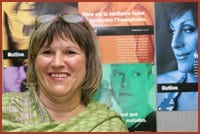HIV infections are still rising in Ottawa. An average of two gay men are seroconverting every week. Syphilis is anchored in our community.
Clearly, the same-old same-sex message isn’t working. Twenty-five years after AIDS first appeared, a new approach to gay men’s health is emerging, and Ottawa is in the forefront. Up next is a different kind of information campaign — ru4real.
“This year we’re looking more to the reasons behind why people might practice unsafe sex,” says Barry Deeprose of the Ottawa Gay Men’s Wellness Initiative. “Last year’s campaign was good, it was edgy, it engaged the mind, and it showed hot disembodied guys having sex. This year we decided to change that.”
But isn’t sex the message that sells? Perhaps not in this case.
“If last year’s was aimed at the head, then this year’s is aimed at the heart,” Deeprose says. “It’s really approaching pretty directly on feelings.”
The campaign originates in the research report of Doctor Barry Adam of Windsor University — Renewing HIV Prevention for Gay and Bisexual Men. It’s a qualitative look at gay men’s health, “very humanistic,” says Deeprose. A second Ontario report also has an influence on the approach — the Ontario Men’s Survey by Ted Meyers.
Adams researched 172 gay men who had either seroconverted in the previous six months, had unprotected sex in the previous six months, or were in couples.
“What he found is that people were often trading off safer sex to get a relationship to validate themselves,” Deeprose explains. “Perhaps they were feeling depressed, perhaps they were part of a visible minority, and so they were trading off in order to have sex in order to have some validation, to feel good about themselves. They didn’t want to risk rejection.
“And actually, we’ve been finding a number of positive men who don’t disclose for fear of risking rejection as well. Adam said that men come out to the bars and to the baths looking for love and connection, and they often find rejection and indifference — it’s a tough world out there.”
And it’s this research that the new campaign is building on. “They acknowledge that there are periods of vulnerability and ask people to take care of themselves, and take care of each other,” Deeprose says.
And this is where the new campaign seeks to differ from its predecessors. “In previous campaigns, my interpretation is that we set up a value structure of whose life is valuable, and it generally was the young, and the hung and the buff,” Deeprose says. “Even when we showed minorities, we showed minorities that really approached the dominant culture’s sense of beauty, as opposed to a real minority, and so this year it was really important when they selected the models that they be real people, and if not full-body shots then at least shots where the head is attached to the body.”
Indeed the images shown are meant to be more reflective of a reality that the public can relate with. The models aren’t perfect, and the tone isn’t sexual at all — something designed to increase accessibility.
“We thought, let’s show gay men in a diverse community in the hopes that that would grow, and that every life is valuable,” Deeprose says.
Over the next four months, the campaign will focus on a serious of four different posters, each with a specific theme. The first touches on condoms and the reasons why we sometimes don’t use them. The second touches on issues facing HIV-positive men, again talking about the reasons they may not protect themselves and others. The third addresses racism and homophobia, because members of visible minorities will often risk unsafe sex just to have sex. The final poster focusses on depression, mental health and isolation.
Overall, the campaign aims to make people think about why they may take risks, and understand that they’re not alone in their reasons. The hope is that once people think about those reasons, they will think more about protecting themselves the next time they have sex.
“Once acknowledging the vulnerability, they also acknowledge that they need to protect themselves,” Deeprose says. “I don’t think we’ve really addressed that before. It’s always been ‘use a condom every time, and have hot, safe and horny sex.’ This is a more profound message.”
Adds Christiane Bouchard from Ottawa Public Health: “We’ve also acknowledged that we won’t reach everybody, because one message won’t cut it for everyone.”
The campaign will ultimately be available in 14 languages, and the website will also include the backgrounders and research data that supports what’s in the campaign. At the end of the four months, the materials will be reviewed and evaluated — something else which has never been done before.
The key to the campaign’s planning is that it’s been developed in Ontario for Ontario men.
“It’s home-grown, and I think that’s what’s essential,” says Bouchard. “This year we got money to do this project, and it was the first time that it was developed here.”
It’s put together by the Ontario Gay Men’s HIV Prevention Strategy Working Group — and supported by 25-30 community organizations from across the province.
Previous campaigns originated elsewhere, and as a result could not really expect to deal with more local concerns. Last year’s Assumptions Campaign had been purchased from San Francisco using money that Health Canada had given to Vancouver groups.
Ottawa Public Health and the Gay Men’s Wellness Initiative will hold an official launch party for the ru4real campaign at the Lookout on Thu Jun 29th from 5pm to 7pm, with a bar blitz on Friday the 30th.


 Why you can trust Xtra
Why you can trust Xtra


